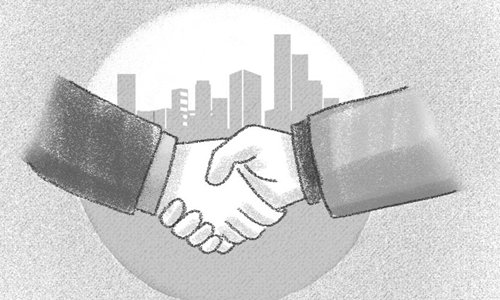HOME >> BUSINESS
Countries need to engage in the digital economy and cyberspace through trust, cooperation
By Toumert AI Source:Global Times Published: 2019/7/1 20:36:42

Illustration: Xia Qing/GT
As our societies have stepped into the era of the information technological revolution, a few nations that were slow to embrace the revolution and the new political environment are now taking the lead in international relations so that they can avoid being sidelined this time.
China is a good example of a nation that has not only made major and historic achievements in political reform but also embraced the industrial revolution, succeeding in a matter of 40 years in catching up with the new economic world order. China has now projected itself well into the future of the fifth industrial revolution.
And that is making waves in the West. Having lost their lead, some developed nations are trying desperately to regain the advantage in the new era of internet communications and AI.
As we entered the 21st century, China was in a position to bring forward a new balance in the international economic and political order, offering a genuine alternative to support developing nations and south-south cooperation to advance their needs in infrastructure and trade opportunities. The success of the Belt and Road Initiative can be seen as a concrete manifestation of the shift that has happened in the global order; a balanced, equitable diversified one.
However, for different reasons including the 2008 financial crisis, most Western nations have found themselves preoccupied with weak economic growth, high unemployment rates, and bankrupt governments.
During this time, China was ready to take its rightful place in the world, and instead of pushing inward, its policymakers took the decision to support the global economic order by pushing investment and opening new trade routes and financial packages for developing nations, especially those in Africa, the Middle East and North Africa region, South America, and South Asia.
Alerted by the new shift, Western policymakers, and especially some hardliners in the US administration, took notice of China's capabilities and spectacular advancement, especially in the field of fifth-generation network technologies. When facing the risk of losing their economic advantage, or the fear of a new world powered by Chinese innovation, they started using outmoded tactics such as protectionism under the label of national security, imposing tariffs, and coercing allies to take sides.
This is dangerous, because if we take, as an example, the ban on Huawei entering the US market and the warnings to other nations about the dangers of using Huawei 5G equipment, it could lead to a unipolar technological drive that would not only limit innovation across the world, but would also create a new gap above the financial, ecological and structural ones that already exist - a technological gap.
We are at a crucial point in our societal evolution. Are we leaning toward an era of shared technological infrastructure, integrating existing and future technological innovation into one hub, and free access to networks, in which all stakeholders have a say in the way forward and participate actively in shaping the future? Or will we divide humanity and thus our economic order between network access origins?
We understand the security and peace issues that the world faces. Nations need to protect their core interests, and of course their cybersovereign rights. But this is the 21st century; we are past ideological confrontations. Our economies are connected whether we appreciate it or not, and economic leadership is no longer about GDP percentages. The future lies in shared innovation and technological know-how.
So when we talk about stopping sharing information if US allies choose a Chinese provider for their network upgrade, this is a message from the last century's security order. We have accomplished so much since World War II, thanks to the US, the Europeans and the Chinese. Our societies have thrived and our economies are better off today. With about 800 million people lifted out of poverty in a matter of 50 years, China has helped to achieve the UN goals of social progress.
Security threats are not the issue. China and America and the rest of the world do not need an arch enemy or a new bipolar technological divide. Security today means engagement in the digital economy and cyberspace through trust and maybe new understanding and cooperation within the era that we are in. China is right to question the nature of Huawei's ban, and to strike back - but not as a retaliatory action, but rather to defend the future of technology and knowledge-sharing.
Developing nations should appreciate Chinese efforts to ensure that technology is not the cause of the next cold war. Innovation should not be limited to two blocs: the US and Europe. The rest of the world should not just be consumers. They should be part of the innovation process, at a minimum offering local solutions for a global purpose.
We hope global policymakers take the Huawei case seriously, and try to find an alternative to confrontation, bans, access limits for markets and opportunities, and dividing the world between technological walls. The truth is that the world needs connectivity and we cannot undo the digital economic integration that is shaping the future.
The author is the director of education with the International Bachelor Program at the International School under the China Foreign Affairs University. bizopinion@globaltimes.com.cn
Posted in: EXPERT ASSESSMENT